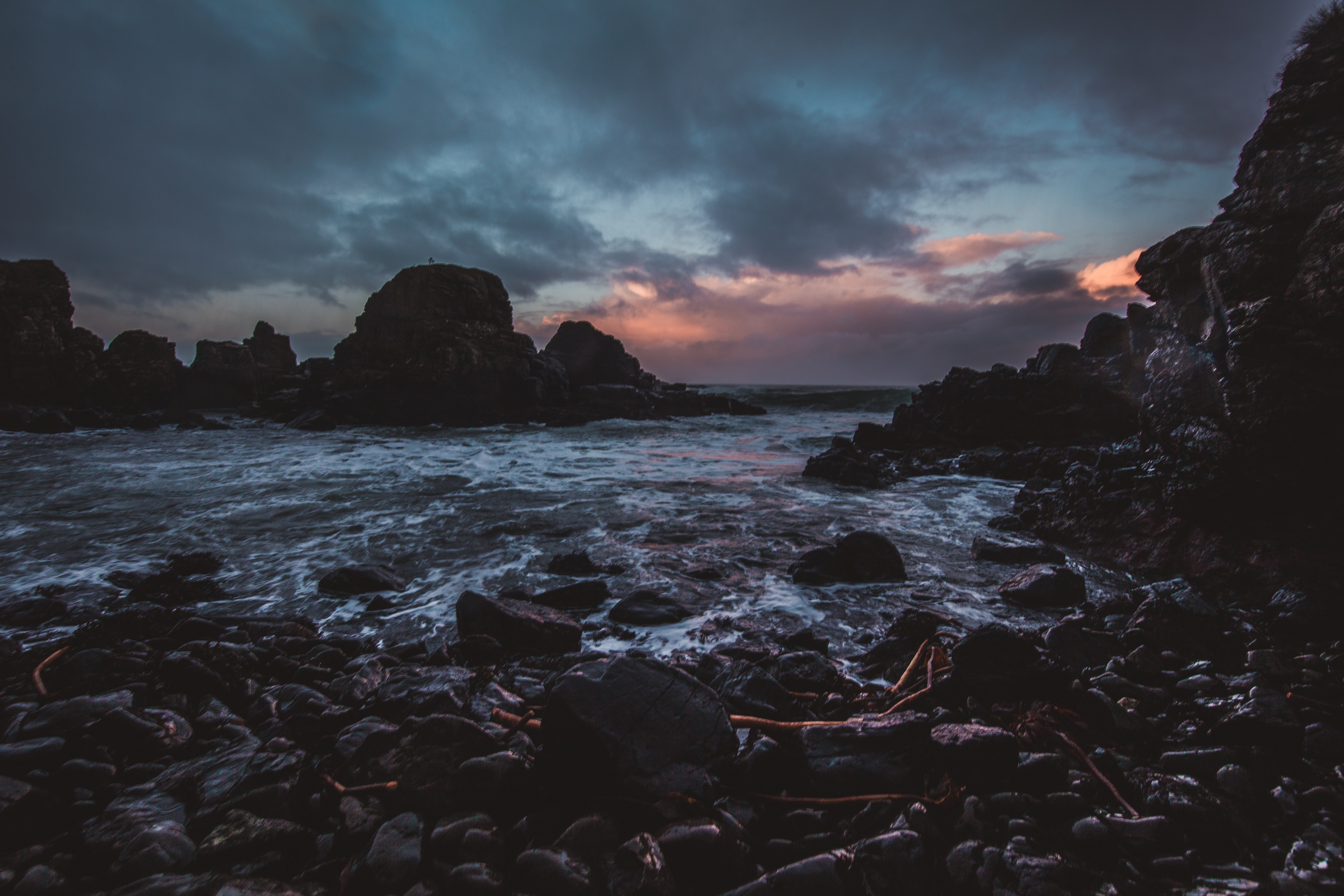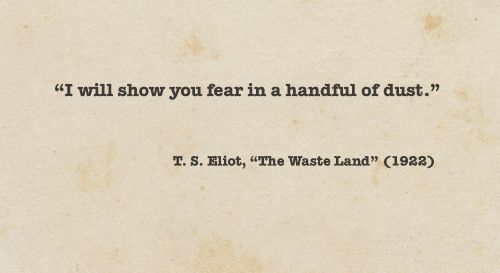 What reared in palsied segments from a blasted hollow was the ruinous progeny of some heinous prior act, a man hauling across the incognizant desert long bereft of any road his own daughter and then violating all touchstones of trust, all human and earthly edicts, before uncoupling her from her life in the cooling night until the land itself sheared and assumed the burden of arbiter and caught him and vise-gripped his leg till he mewled and died sluggardly under the searing day that followed, the sun itself meting justice and broiling first his eyes to grayish raisins in their sockets then his sobbing brain in its canted bone pan. From the drying juices of his corpse some unholy alchemy spawned this flapping, fractured thing born thirsty and agonized. With the falling of night and the cooling of the red stones it staggered and moaned a crooked wan-lit path toward the lights of a town scattered like tiny stars in a great throated void.
What reared in palsied segments from a blasted hollow was the ruinous progeny of some heinous prior act, a man hauling across the incognizant desert long bereft of any road his own daughter and then violating all touchstones of trust, all human and earthly edicts, before uncoupling her from her life in the cooling night until the land itself sheared and assumed the burden of arbiter and caught him and vise-gripped his leg till he mewled and died sluggardly under the searing day that followed, the sun itself meting justice and broiling first his eyes to grayish raisins in their sockets then his sobbing brain in its canted bone pan. From the drying juices of his corpse some unholy alchemy spawned this flapping, fractured thing born thirsty and agonized. With the falling of night and the cooling of the red stones it staggered and moaned a crooked wan-lit path toward the lights of a town scattered like tiny stars in a great throated void.
Not really a town. A convenience store with twin gas pumps, crude sentinels, a dusty bestrewing of trailers, a barroom squat and yellow-brown as a bark scorpion, a single red light pendent as a polyp over a crossroads.
She'd stopped because she dripped without moisture, because she needed relief from the eternal dry breath of the road and its cartoon hornet string of broken lines. The smeary windowpanes of her eyes reflected nothing. Her twenty-four hours of freedom from a man hellbent on her ruin yet joyless. The bar had no signboard or emblem aside from a Sorry We're Open sign in its only window, and the inside was small and dark and hot and rank; she named it in her mind the Devil's Armpit and thought about smiling.
But she didn't smile. The barkeep cocked an eyebrow and with her head she signaled a cluster of bottles, whiskies.
"Give me chain lightnin'," she said, her voice strange like that of an exotic bird in a cave.
He grunted and poured a dark amber shot glass and she drank it back, her throat taut, her eyes tight, and when "The Master's Call" by Marty Robbins rose and soared from buzzing speakers, though no god had ever dwelled in any part of her, a tear gathered in the corner of her eye.
Two men had wandered in, like moths find their way on a porch around nightfall. One of the men wore his darkness like a prioress wears her faith—as a part of him, his oil-black hair gleaming like the nape of a corvid, his one eye a campfire coal soliciting dark tales, his other blank and nacreous. The second man was no account.
They took up a place on the other end of the bar, four or five scuff leather stools between them.
"So, lady, tell me your first sight this sunrise." He didn't look her way because he didn't have to.
"With all respect, sir, I ain't exactly enamored of conversation right now." She also looked only in front, at the grimy bottles, at black-painted drawers now fulvous with the chalky exhalations of the land. Nothing here could be kept. All of it ran between splayed fingers amid silence.
"We-ell. Ordinarily I'd grant your respectful wish to be left alone, Miss. I truly would. But truth is, present circumstances militate agin' such a relinquishment."
She looked his way at last, for scant moments, heartbeats.
"Why might that be… Mister?"
Somehow he had grown more ursine during this short interchange. His snoutish face encased in rank dark fur. His one good eye a black pearl defying the abalone vacancy of his other. A stench coming from him.
"Why that might be… Missy… is this. You're runnin' from something. That much you cain't argue with, and neither can I. What you're runnin' from ain't too important, but what is important, to me, is where you is now. Your present... solitude. That I need to state for the goddamned record. And contemplate."
She thought about standing up and walking out, only as soon as the thought crawled its way across her skittering mind, she recognized it for the pale aborted thing it was. Whatever this man was, she needed to face him like she'd finally faced Dwayne and his fists a day or two ago. In some ways, this cornshucker and her ex were brothers: Cain and Cain. She never minded cursing, but she stockpiled her own profanities until the right moments.
She thought about his hands, his fingers, where they'd been, what things they'd ferreted and infringed upon.
"I tried respect, sir. Now I'm gonna tell you a truth: it ain't none of your goddamned business and I'd much prefer to be left to dwell on my loneliness entirely my ownself, the way it oughta be. Mostly so I can figure if bein' lonely might yet mean freedom."
He stayed silent for a good ten minutes while she sipped on her shine and the barman dissembled as if to polish stuff already partway buffed and the no account sidekick grinned at some deviant joke no soul would get to speak aloud on this earth.
Then the man moved fast. Was behind her and wrenching her arm high behind her back.
"You are comin' outside with me," he said, with shocking gentleness.
She looked and knew instantly the bartender would be no help.
No account was grinning and displaying three sullied teeth with a kind of truculent pride.
A grim marionette, she stumbled forward if only to prevent herself from falling and was quickly under a star field so bright it yet stole her breath despite her predicament.
"What are you doing?" she whispered.
"Takin' you to my vehicle, Miss. Then to a different place."
They approached the dark shape of a pickup and, like some simian thing, no account swung his misshapen body into the bed while the bad man with one good eye pulled out the key from his pocket.
And that was when it staggered from out of the scrubland, lurched uncouth from an untrod trail in the broken hills, and began to dismantle a thing it knew about: something unapologetic, something mean as a scorpion in a resting boot, something belligerent, something that had sired its own torment. It took its time, tore and chewed slowly with claggy and crenulate teeth, jaw hasping and unhasping, barely registering the man's garish hoots as screams, beyond the rupture of the man's cords in his gorge, beyond the hellish slow minutiae of his drawn-out annihilation.
Instead of running, as no account had already done, she was rooted, some part of her desirous of this grotesque theater, hungry to see such unspeakable retribution visited on the wicked. Yearning to witness a delinquent accounting.
"Goodnight motherfucker," she whispered.
When it was done, and the meat on the floor had stopped twitching, the obscenity looked her way a second or two, before it lumbered its graceless way back the way it had come, into the scorched hills, where nothing awaited it and nothing wanted it and nothing whatsoever wished it into a dirty world, not now and not ever, the good lord help us, amen.
 David Antrobus Posted on
David Antrobus Posted on  Saturday, May 1, 2021 at 8:25PM
Saturday, May 1, 2021 at 8:25PM  Inside the tumbledown tavern, the young man from the north with the black beard sits beside the grey-bearded men like a raven among toothless old wolves. Lanterns gleam weakly. Tobacco and salt and fish mix with the tang of whisky. Quick glances are all they spare him until one of them speaks.
Inside the tumbledown tavern, the young man from the north with the black beard sits beside the grey-bearded men like a raven among toothless old wolves. Lanterns gleam weakly. Tobacco and salt and fish mix with the tang of whisky. Quick glances are all they spare him until one of them speaks.








